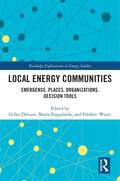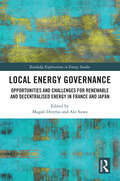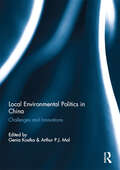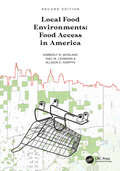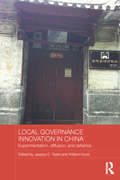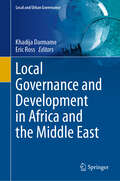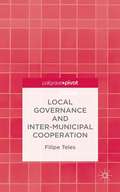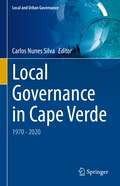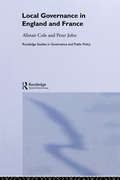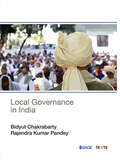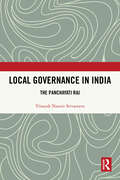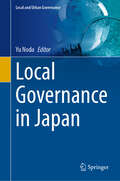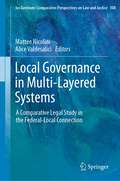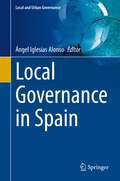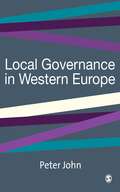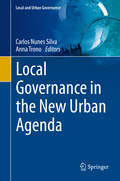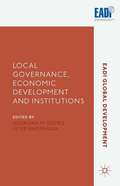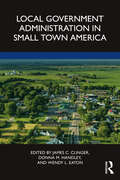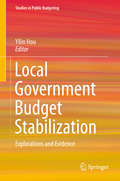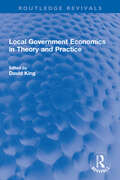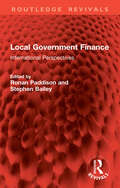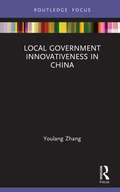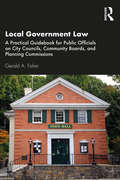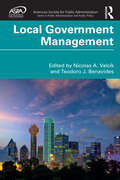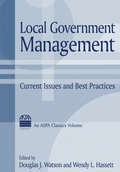- Table View
- List View
Local Energy Communities: Emergence, Places, Organizations, Decision Tools (Routledge Explorations in Energy Studies)
by Gilles DebizetThis book draws on social science analysis to understand the ongoing dynamics within and surrounding local energy communities in reliably electrified countries: Belgium, Canada, Colombia, France, Germany, India, the Netherlands, Spain, Switzerland and the United Kingdom. It offers a comprehensive overview of recent results and thus outlines a diversity of drivers and levers for scaling up energy communities or, at least, local energy sharing. Analysing the main types of energy communities such as collective self-consumption, citizen cooperatives and peer-to-peer digital platforms, the book does not only raise new questions for social scientists, but also offers a comprehensive overview for all those contributing to the circular economy and the decentralization of energy production in inhabited areas where energy consumption is concentrated. This book provides input for the ongoing debates in many European countries implementing the national law on the European directives for energy communities. Furthermore, without evading the antagonism between cooperative and market approaches, or the contradictions between different issues, the book outlines the innovative decision-making tools that can facilitate the development of local energy production and sharing systems. As well as being of interest to postgraduates and researchers in the field of energy studies, this book will be vital to energy professionals looking to support local energy communities’ decision-making and design, who wish to consider sociological, organizational and territorial dimensions.
Local Energy Governance: Opportunities and Challenges for Renewable and Decentralised Energy in France and Japan (Routledge Explorations in Energy Studies)
by Magali Dreyfus and Aki SuwaLocal Energy Governance: Opportunities and Challenges for Renewable and Decentralised Energy in France and Japan examines the extent of the energy transition taking place at a local level in France and Japan, two countries that share ambitious targets regarding the reduction of GHG emissions, their share of renewable energy and their degree of market liberalization. This book observes local energy policies and initiatives and applies an institutional and legal analysis to help identify barriers but also opportunities in the development of renewable energies in the territories. The book will highlight governance features that incubate energy transition at the local level through interdisciplinary contributions that offer legal, political, sociological and technological perspectives. Overall, the book will draw conclusions that will also be informative for other countries aiming at promoting renewable energies. This book will be of great interest to students and scholars of energy policy and energy governance.
Local Environmental Politics in China: Challenges and Innovations
by Genia Kostka & Arthur P.J. MolKnowledge and insight in national environmental governance in China is widespread. However, increasingly it has been acknowledged that the major problems in guiding the Chinese economy and society towards sustainability are to be found at the local level. This book illuminates the fast-changing dynamics of local environmental politics in China, a topic only marginally addressed in the literature. In the course of building up an institutional framework for environmental governance over the last decade, local actors have generated a variety of policy innovations and experiments. In large measure these are creative responses to two main challenges associated with translating national environmental policies into local realities. The first such challenge is apolicy implementation gap stemming from the absence of the state capacity necessary to the implementation of environmental measures. The second challenge refers to the need for local non-state actors to engage in environmental management; oftentimes such aparticipation gap contributes to implementation failures. In recent years, we have seen a multitude of initiatives within China at the provincial level and below designed to bridge bothgaps. Hence, the central aim of this book is to assess these experiments and innovations in local environmental politics.This book was originally published as a special issue of the Journal of Environmental Policy and Planning.
Local Food Environments: Food Access in America
by Kimberly B. Morland Yael M. Lehmann Allison E. Karpyn"In this book, Morland, Lehmann, and Karpyn discuss the critical need for healthy food financing programs as a vehicle to improve food access for all Americans. In my career as a public servant, there are very few legislative achievements that I’m prouder of than the Healthy Food Financing Initiative, which started in my home state of Pennsylvania. The program gained status as a proven and economically sustainable federal program that is helping to improve the quality of life in our neighborhoods: by allowing millions access to healthy, affordable food." – Congressman Dwight Evans United States House of Representatives, Pennsylvania, District 3 "If we work together, we can create a healthy food system that is equitable and accessible to all. This book highlights the importance of healthy food projects like grocery stores, farmers markets, co-ops, and other healthy food retail in revitalizing local communities across the country. Without basic nourishment, kids and families simply won’t be successful – which is why this book is a must read." – Sam Kass President Obama’s Senior Nutrition Policy Advisor and Executive Director of Let’s Move! "Morland and colleagues’ new second edition provides an excellent foundation for courses in food policy and community nutrition. Their detailed review of the economics of local and national food financing will open students’ minds to the complexity inherent in measuring and interpreting outcomes." – Robert S. Lawrence, MD, MACP Founder and Former Director of the Center for a Livable Future Johns Hopkins University, Bloomberg School of Public Health Features ● Describes how disparities in food access formed in the United States ● Includes federal policies and programs aimed at addressing food access in underserved areas, including the Healthy Food Financing Initiative ● Features examples of state initiatives that address poor access to food retailers ● Provides methods for program evaluation utilizing principals of implementation and dissemination science ● Includes critical thinking questions and embedded videos aimed to generate discussions on how restricted local food environments in the United States are rooted in economic disparities that impact food access as well as housing, education, and job opportunities
Local Governance Innovation in China: Experimentation, Diffusion, and Defiance (Routledge Contemporary China Series)
by Jessica C. Teets William HurstDespite a centralized formal structure, Chinese politics and policy-making have long been marked by substantial degrees of regional and local variation and experimentation. These trends have, if anything, intensified as China’s reform matures. Though often remarked upon, the politicsof policy formation, diffusion, and implementation at the subnational level have not previously been comprehensively described, let alone satisfactorily explained. Based on extensive fieldwork, this book explores how policies diffuse across China today, the mechanisms through which local governments actually arrive at specific solutions, and the implications for China’s political development and stability in the years ahead. The chapters examine how local-level institutions solve governance challenges, such as rural development, enterprise reform, and social service provision. Focusing on diverse policy areas that include land use, state-owned enterprise reform, and house churches, the contributors all address the same overarching question: how do local policymakers innovate in each issue area to address a governance challenges and how, if at all, do these innovations diffuse into national politics. As a study of local governance in China today, this book will appeal to both students and scholars of Chinese politics, comparative politics, governance and development studies, and also to policy-makers interested in authoritarianism and governance.
Local Governance and Development in Africa and the Middle East (Local and Urban Governance)
by Eric Ross Khadija DarmameThis edited volume surveys how current local governance policies and development strategies across Africa and the Middle east are advancing Sustainable Development Goals (SDGs). Morocco's recent experience with local development strategies serves as starting point for the discussion. Over the past decade, Morocco has undertaken a variety of initiatives aimed at reducing poverty and social inequalities and providing essential services to marginalized communities. These initiatives provide great opportunities to reshape the spatial organization of regions, and to address chronic local issues of infrastructure and investment. Local governance is the most direct way of providing basic services to populations, helping to alleviate socio-spatial inequalities. Also, it is and will continue to be the best way to engage people and local governments in economic, social and human development agendas. However, placing local governance at the heart of development strategies requires going well beyond participatory approaches to policy making. Local communities and their governments need to be empowered. As responses to the Covid19 epidemic have laid bare, new and more efficient modes of territorial governance are needed at local and regional levels if current global-scale challenges are to be met. While development and governance strategies like Morocco's are framed by global agreements and standards, there is a need to understand them at the regional scale. Are there discernible patterns in how African and Middle Eastern countries design and implement them? This volume assembles case studies from across the region, allowing for understandings that transcend the usual spatial dichotomies between "North" and "Sub-Saharan" Africa, between Africa and the Middle East, and between the "Anglophone" and "Francophone" spheres. The volume builds upon an international conference on the topic held at Al Akhawayn University in Ifrane, Morocco Morocco in February of 2022. The volume is aimed at a readership of researchers and development practitioners, and will be of most direct benefit to advanced undergraduate and graduate-level students.
Local Governance and Inter-municipal Cooperation
by Filipe TelesTerritory and scale have been some of the most relevant topics in recent political science, but do we know enough about cooperation between local governments? How we think about local government has changed significantly and requires us to be equipped with new epistemological gear, considering more variables and social functions of local government than before. For instance, is inter-municipal cooperation a special arrangement? The answer is certainly positive, not as a consequence of its nature when compared to other alternatives of policy coordination and service delivery, but because it captures almost every facet of the complexity of contemporary territorial governance. Bringing relevant case studies, previous research and available literature together, this book will help researchers, students and practitioners with these ideas. The author provides comprehensive information about inter-municipal cooperation and identifies the main gaps in contemporary research.
Local Governance in Cape Verde: 1970 - 2020 (Local and Urban Governance)
by Carlos Nunes SilvaThe book provides a pioneering overview of the evolution of the local government and urban policy in Cape Verde after independence, offering a multi-scale perspective of local governance in Cape Verde from 1970 - 2020. It examines the process of urban development in the country, and in the capital city in particular, and explores the consequences and challenges for spatial planning, housing, urban heritage, and the environment, namely issues related to climate change in the post-independence period.
Local Governance in England and France (Routledge Studies in Governance and Public Policy #6)
by Peter John Alistair ColeLocal Governance in England and France addresses issues at the cutting edge of comparative politics and public policy. The book is based on extensive research and interviews, over 300 in total, with local decision makers in two pairs of cities in England and France: Lille and Leeds; Rennes and Southampton. No other Anglo-French comparative project has ever gone into such depth - based on actual case studies - making this book an invaluable resource for students and professionals alike. The book poses key questions about the changing role of the state, the difficulties of policy coordination in a fragmented institutional context, and about the relationship between governance, networks as well as political and democratic accountability. It will be of great interest to the professional research community, and practitioners in Britain, France and beyond, as well as to students of comparative politics, European public policy, British / French politics, European studies, public management and local government studies.
Local Governance in India
by Bidyut Chakrabarty Rajendra Kumar PandeyLocal Governance in India draws on the basic theoretical and practical aspects of localizing governance and illuminates how local governance unfolds in India. To help comprehend relevant issues contextually, the book focuses on the historical, socio-economic and political milieus, and draws extensively on examples and cases from India. By understanding local governance in the wider political scenario, it also endeavours to reconceptualize local governance in India as integral to the country's macro politics. The book offers a broad analysis of specific programmes, such as MGNREGA, and structures of governance at the grass-roots level, thereby providing insights into relatively less-discussed aspects and helps grasp the concept of governance in a policy perspective. Containing varied examples, case studies and literature review, this textbook would be an ideal companion for students of political science, public administration, urban and rural development, sociology, social work and economics. Key Features: Provides a concise and well-balanced coverage of rural and urban governance in India Incorporates insights into and explanations of both Western and non-Western perspectives of local governance Dwells on contemporary trends in democratization and local governance Makes a projective study of future of local governance in India
Local Governance in India: The Panchayati Raj
by Vinayak Narain SrivastavaLocal governance is a necessary condition for maturation of political and economic democracy. It undermines the vestiges of political authoritarianism and extends democracy to the grass roots. This book presents a study, analysis and an overview of local governance (Panchayati Raj) in India.Popular participation further leads to the emergence of a viable, dynamic, and healthy political culture, providing accessible channels of political articulation, making the institutions much more accountable and much less alienated and, therefore, much more legitimate. The volume, with its special focus on Uttar Pradesh, discusses crucial themes like self-government, political culture, and participatory politics; institutionalisation of local democracy and governance in post-colonial India; dynamics, functioning, and organisation of local governance; local industrialisation and finance; developmental intervention in Panchayati Raj; and local democracy and governance in a microcosm to showcase the potential of local governance as a holistic institution of democracy and development at local levels.This book will be an interesting read for academics and students of political science, public administration, public policy, governance studies, civil service, political sociology, development studies, policymakers, think tanks, non-governmental organisations and professionals working in the area.
Local Governance in Japan (Local and Urban Governance)
by Yu NodaLocal Governance in Japan is the first comprehensive exploration of local government in Japan, examining the sustainability of local governments operating with limited policy resources. This interdisciplinary study integrates insights from public administration, political science, economics, sociology, and business management. Japan has faced significant challenges in ensuring sustainability from rapid economic growth in the mid-20th century to the bubble's burst in the 1990s, and the population decline since 2008, along with large-scale natural disasters. Amid systemic changes—including a 46% reduction in local governments—local administrations have been developing effective cooperative relationships between local governments and exploring the significance of cooperation with citizens, NPOs, and the private sector. Characterized by extensive public facilities and infrastructure, Japan’s local governments provide a model for addressing future governance challenges. This book is essential for scholars, policymakers, and practitioners seeking innovative strategies to maintain public services and navigate the complexities of governance in a resource-constrained world.
Local Governance in Multi-Layered Systems: A Comparative Legal Study in the Federal-Local Connection (Ius Gentium: Comparative Perspectives on Law and Justice #108)
by Matteo Nicolini Alice ValdesaliciThe book provides a comprehensive analysis of local government in federations. It fills the gap in current legal research and positions local government in federal studies through the lenses of comparative law, adopting a more nuanced approach to local government. The book considers the shortcomings between the black-letter constitution and its operational rules. Whether (and how) the regime of local government is implemented is more relevant than its formal-but-ineffective recognition. The comparative survey discloses the variety local institutions take in different federal contexts. Divided into three parts, the book comprises chapters investigating local government in systems that, to various degrees, have been examined and classified as federal. Scholars throughout the world have examined the federal-local connection in aggregative federations, (the USA, Canada, Switzerland, Germany, Australia, and Austria), devolutionary ones (Belgium, Bosnia Herzegovina, Italy, Spain, the UK, Argentina, Brazil, Mexico, and the Russian Federation), as well as in federations beyond the West, where federalism-as-a-colonial-legacy has undergone a process of reinvention affecting the federal-local connection (South Africa, Ethiopia, India, Nigeria, Comoros, Democratic Republic of Congo, Nepal, Palau, Federated States of Micronesia; St. Kitts and Nevis; United Arab Emirates; and Pakistan).
Local Governance in Spain (Local and Urban Governance)
by Ángel Iglesias AlonsoThe book addresses in detail local governance in Spain. In recent decades, local governments in Europe have increasingly found themselves under pressure from a multitude of new challenges, such as demographic change, climate change, fiscal austerity policies, digitization, the demand for more citizen participation in local affairs, and the migration crisis in some of them, to name just a few. Consequently, a wave of political and administrative reforms to address these challenges, pressures and problems, has changed local governance in many countries. In part, these changes were the result of reform policies introduced by national and state governments, often triggered by austerity policies, which has become an overwhelming reality for Spanish local governments that have been forced to introduce innovations in local governance. This book aims to give an account of these innovations in local governance in Spain.This book considers the local political-administrative structure in its dimensions, focusing on the analysis of its party system, electoral competition and political behavior in the local arena, as well as on local finances, all of which are determining elements in urban and rural governance processes. On the occasion of the recent crisis unleashed by Covid-19, the book will also deal with local governance in crisis situations. The book will also contextualize local governance processes in Spain in relation to the trends in local governance observed in other European countries.
Local Governance in Western Europe (SAGE Politics Texts series)
by Dr Peter John`Its strength lies in combining theoretical insights with an impressive range of empirical material. The analysis is subtle and multi-layered.... This is a timely and important book' - Political Studies `Local governance have gained massive attention among scholars and practitioners during the past several years. Peter John's book fills a void in the literature by tracing the historical roots of local governance and by placing his findings in a comparative perspective' - Professor Jon Pierre, University of Gothenburg, Sweden `Peter John has produced a fascinating and stimulating book in which he assesses current developments in urban politics and local government in Europe and suggests how these changes are leading to different patterns of sub-national territorial politics in the EU today. What he has to say is of important interest to all students of local government; comparative politics and of territorial politics more generally' - Michael Goldsmith, University of Salford `this book offers a fascinating comparative analysis... themes such as New Public Management, globalisation, regionalism and privatisation will be relevant to numerous courses in government, politics, public administration and public policy' - West European Politics This text provides a comprehensive introduction to local government and urban politics in contemporary Western Europe. It is the first book to map and explain the change in local political systems and to place these in comparative context. The book introduces students to the traditional structures and institutions of local government and shows how these have been transformed in response to increased economic and political competition, new ideas, institutional reform and the Europeanization of public policy. At the book's core is the perceived transition from local government to local governance. The book traces this key development thematically across a wide range of West European states including: Belgium, France, Greece, Italy, Germany, the Netherlands, Norway, Portugal, Spain and the United Kingdom.
Local Governance in the New Urban Agenda (Local and Urban Governance)
by Anna Trono Carlos Nunes SilvaThe book explores and discusses some of the changes, challenges and opportunities confronting local governance in the context of the new urban paradigm associated with the HABITAT III New Urban Agenda, a 20-year strategy for sustainable urbanization, adopted in October 2016 in Quito, Ecuador. The chapters included in the book address public policy issues from different theoretical perspectives and methodological approaches, written by authors from different academic disciplines within the broad area of social sciences (Geography, Political Science, Public Administration, Spatial Planning, Law, Regional Science, among other fields), and offer an inter-disciplinary vision of these issues. The chapters are written by members of the International Geographical Union (IGU) Commission on Geography of Governance.
Local Governance, Economic Development and Institutions (EADI Global Development Series)
by Peter Knorringa Georgina GómezLocal Government Administration in Small Town America
by James C. Clinger Donna M. Handley Wendy L. EatonIn government administration and leadership, rural community leaders face unique challenges in delivering public services including (but not limited to) education, health care, and public safety. Meanwhile, residents who live in smaller and more isolated rural settings often face greater difficulties accessing provisions and services or commuting to work, among other economic development challenges. These factors may affect a community’s resiliency to and recovery from shocks such as the COVID-19 pandemic. Local Government Administration in Small Town America devotes some overdue scholarly attention to the governance and administration of public programs in small towns and rural communities in the United States.The chapter contributors to this volume analyze some of the unique challenges rural communities face, as well as the policy tools that their governments employ to address them. The book explores ways that small town governments collaborate with one another, the state, and the federal government, and examines how local government officials use knowledge of people and place to improve policy performance. The chapters are designed to provide cases and strategies for students and practitioners in public administration to use in a small town environment, while also considering a community’s distinctive social and political culture, which determines how local political leaders and government practitioners might respond to demands and challenges they face. Local Government Administration in Small Town America is an essential resource for undergraduate and graduate students studying local government, as well as for rural practitioners navigating evolving challenges unique to their communities.
Local Government Budget Stabilization
by Yilin HouThis book is the first comprehensive, full-scale treatment of the politics, law, and economics with regard to the policies and policy instruments for budget stabilization at the local level. It examines budget stabilization in the United States from the 1910s to 2010 (from adoption of public budgeting in this country through the Great Recession). In addition, it provides details on the methods and results of empirical tests of the effects of budget stabilization instruments on government operations, key/basic services provision, and some other aspects of social and economic life at the local level, including full-purpose governments (county, metro city, municipality, township, and village) as well as special (single-) purpose governments (like school districts and transportation districts). This book dissects an important and pressing issue in public financial administration, analyzes a lesson that has been in the learning process, especially in the United States, and identifies theoretical threads for scholarly refinement, which will be put into specific contexts of policy design and implementation. This book will be of interest to scholars in political science, economics, public choice and in public administration, where it will also appeal to policy-makers.
Local Government Economics in Theory and Practice (Routledge Revivals)
by David KingFirst published in 1992, Local Government Economics in Theory and Practice is an effort to rectify the lack of a comparative analysis between democratic local governments of various countries and their methods of financing. A series of chapters examines the theoretical basis for different systems of local government finance and how these systems work out in practice. The book covers various aspects of reforms in the United Kingdom and elsewhere, and includes a discussion of the rationale for the community charge. This collection of essays will be of importance to students of economics and public policy.
Local Government Finance: International Perspectives (Routledge Revivals)
by Ronan Paddison Stephen BaileyOriginally published in 1961, this book became widely used as a textbook, as an important source of primary data on British government expenditure statistics and as the point of departure for further empirical and analytical studies of the behaviour of governments. The book was recognised as one of the formative influences in the development of a positive theory of government expenditure which sought to explain the size and structure of the system of public finance rather than justify it
Local Government Innovativeness in China (Routledge Focus on Public Governance in Asia)
by Youlang ZhangLocal government innovation has become one of the most important topics on China’s policy agenda in recent decades. This book explains why some local governments are more innovative than others. This book uses a novel theoretical framework and points out that in China’s multi-level government structure, the administrative hierarchy and the span of control could shape local governments’ innovation motivation, innovation capability, and innovation opportunity, thus influencing local government innovativeness. The author systematically analysed the 177 winners and finalists of the biennial Innovations and Excellence in Chinese Local Governance (IECLG) Awards Programme from 2001 to 2015 to provide convincing empirical evidence to support this theory.This book adopts an institutional approach to explaining local government innovativeness in China and may be a useful reference to help us learn more about local government decisions and behaviours.
Local Government Law: A Practical Guidebook for Public Officials on City Councils, Community Boards, and Planning Commissions
by Gerald A. FisherLocal Government Law provides a unique resource with concise, easy-to-understand explanations of important legal issues faced by local public officials, community boards, and city councils. From the moment officials take office, they face decisions related to basic principles found in state and federal law. The same is true for those in the private sector aiming to work successfully with local governments. This practical guidebook will empower public and private representatives with a functional grasp of legal principles, with chapters explaining what a local government is, the requirement to follow due process, local land use controls, the basics of the Freedom of Information Act, and many other important subjects that regularly arise. As a practical guidebook on local government law, this book provides a basic and empowering understanding for officials and private actors in the local government arena.
Local Government Management (ASPA Series in Public Administration and Public Policy)
by Nicolas A. Valcik and Teodoro J. BenavidesIn a recent paradigm shift, local governments find themselves shouldering more responsibility for day-to-day governance and crisis management, thanks to regulations and federal spending cuts. While 20 years ago a book on local government administration might have been considered complete with chapters on budgeting, public personnel management, productivity and responsivity, and community engagement, any discussion of local government must now also include resilience, emergency management, climate change, smart cities, social media, and infrastructure funding. Bringing together key voices from the academic and public sectors, Local Government Management offers techniques and insight into how local government can most effectively lead and manage their resources in an evolving political—and environmental—landscape. Featuring examples from expert contributors’ own decades of public service and research, this forward-thinking book explores the rapid speed of change in local communities and the need for local government to not only adapt but also proactively plan for the future. Local Government Management is essential reading for local government officials, public stakeholders, practitioners, and students of public administration and management.
Local Government Management: Current Issues and Best Practices
by Douglas J. Watson Wendy L. HassettSome of the very best writings on issues involving local government can be found in journals published by the American Society for Public Administration or journals with which ASPA is associated. This volume includes thirty of the most outstanding articles that have been published over the past sixty years in these journals. Local Government Management is an ideal supplement for any course in local management and administration, whether the audience is students or practicing professionals.
